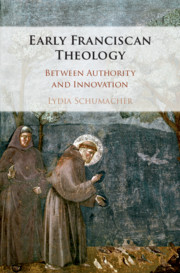Book contents
- Early Franciscan Theology
- Early Franciscan Theology
- Copyright page
- Dedication
- Contents
- Acknowledgements
- Abbreviations
- Chapter 1 Early Franciscan Theology: An Introduction
- Chapter 2 The Franciscan Context
- Chapter 3 The Philosophical Context
- Chapter 4 Theological Vision
- Chapter 5 Theistic Proof
- Chapter 6 The Divine Nature
- Chapter 7 The Trinity: Context
- Chapter 8 The Trinity: Doctrine
- Chapter 9 Christology
- Chapter 10 Incarnation
- Chapter 11 Moral Theology
- Chapter 12 Conclusion: The Promise of Early Franciscan Theology
- Bibliography
- Index
Chapter 3 - The Philosophical Context
Published online by Cambridge University Press: 14 June 2019
- Early Franciscan Theology
- Early Franciscan Theology
- Copyright page
- Dedication
- Contents
- Acknowledgements
- Abbreviations
- Chapter 1 Early Franciscan Theology: An Introduction
- Chapter 2 The Franciscan Context
- Chapter 3 The Philosophical Context
- Chapter 4 Theological Vision
- Chapter 5 Theistic Proof
- Chapter 6 The Divine Nature
- Chapter 7 The Trinity: Context
- Chapter 8 The Trinity: Doctrine
- Chapter 9 Christology
- Chapter 10 Incarnation
- Chapter 11 Moral Theology
- Chapter 12 Conclusion: The Promise of Early Franciscan Theology
- Bibliography
- Index
Summary
In many accounts of Western intellectual history, the emergence of scholasticism is closely associated with the recovery of Aristotle’s major philosophical works, which had been unavailable in the West in the earlier Middle Ages.1 Actually, Alexander of Hales and the Halensian Summists have often been hailed as some of the first to incorporate Aristotle, though these claims have not really been substantiated by textual research. The purpose of this chapter is to demonstrate that Aristotle was far from the only or even the most predominant philosophical influence during the great Latin translation movement, which spanned the century between 1150 and 1250.2 In addition to Aristotle, this movement saw many works by Arabic scholars translated into Latin. My account of these translations immediately below will reveal the extent to which the Islamic scholar Avicenna in particular influenced early Franciscan thought and indeed the school’s reading of Aristotle.
- Type
- Chapter
- Information
- Early Franciscan TheologyBetween Authority and Innovation, pp. 55 - 77Publisher: Cambridge University PressPrint publication year: 2019



